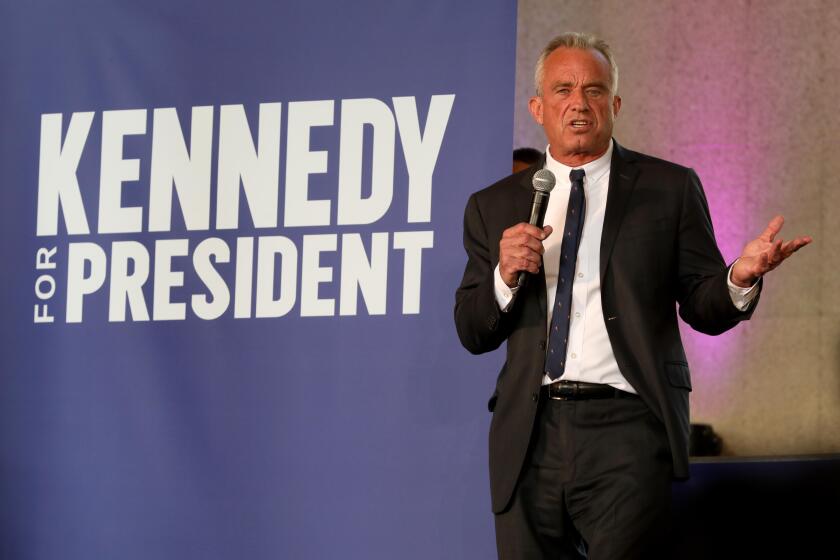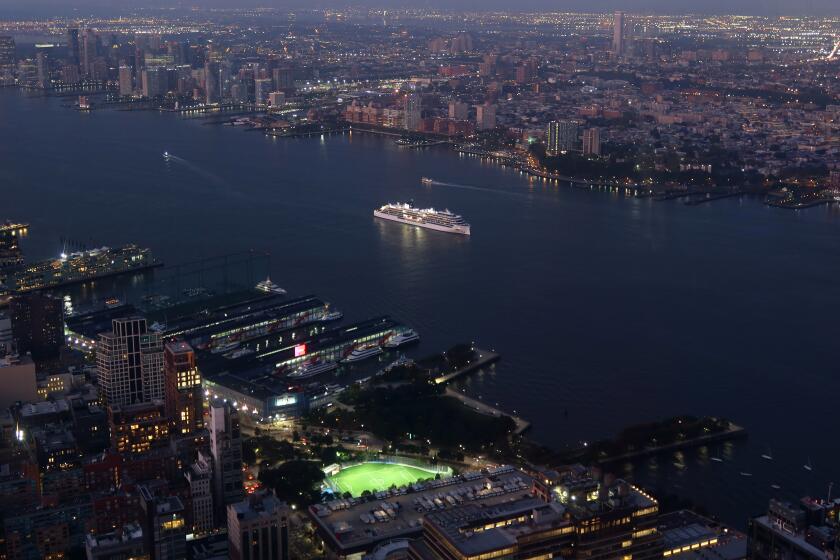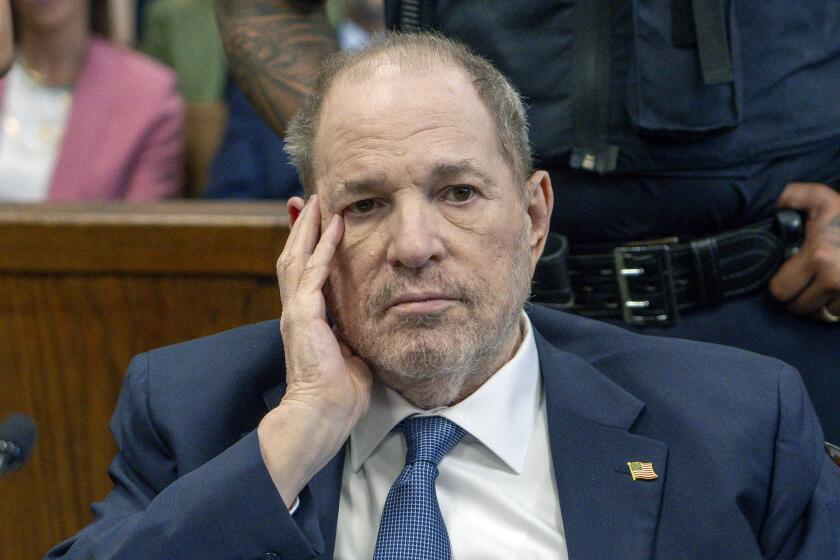Reagan Rules Out Force in Panama : But U.S. Still Recognizes the Ousted President
The Reagan Administration declared Friday that it still recognizes Eric A. Delvalle as the president of Panama but ruled out U.S. military intervention to restore him to power or topple strongman Manuel A. Noriega.
“No I don’t think that’s the answer,” President Reagan said when asked if military force might be used by the United States. “There are limits on what we can do.” But he declined to discuss other alternatives, such as a trade embargo.
The President, posing for pictures at the White House during a session with Republican state chairmen, told reporters that U.S. officials knew about, but did not engineer, Delvalle’s unsuccessful attempt Thursday to fire Noriega as head of Panama’s Defense Forces.
Hoping for OAS Action
While Delvalle’s move led to his own ouster by the National Assembly, his continued recognition by the United States could help a plea he has made for assistance from the Organization of American States.
Administration officials appeared hopeful that the OAS--composed of 31 nations in the Western Hemisphere--will take the next steps toward forcing Noriega to step down and make way for a democratic government.
The Administration has been increasing its pressure on the military leader since his indictment earlier this month in Florida on drug trafficking, money-laundering and racketeering charges. Friday it indicated it will await further developments and defer a request from Delvalle for economic sanctions against Panama.
The OAS’s Washington headquarters was plunged into chaos by the crisis as Delvalle’s newly appointed envoy and Noriega’s handpicked emissary both appeared and vied for diplomatic recognition.
The Delvalle envoy, Lawrence Chewning Fabrega, demanded that the organization convene an extraordinary meeting of its Permanent Council to consider possible measures. One could be a censure, which would increasingly isolate and besiege the Noriega regime.
But Chewning’s demand, backed by El Salvador, was at least temporarily denied late Friday by OAS Chairman Juan Alberto Llanes of Paraguay, who argued that members need more time to coordinate their positions. He indicated that he might reconsider the request Monday, depending on events over the weekend.
Could Prove Decisive
If history is any guide, the OAS’s choice between Chewning and Noriega emissary Roberto Leyton could prove decisive for Panama.
In 1979, the OAS recognized the diplomatic credentials of the Nicaraguan Sandinistas before strongman Anastasio Somoza left office. Within days, it called for the “immediate and definitive replacement” of Somoza. And within a month of that move, Somoza stepped down.
The Panama power struggle has pitted Washington and several of the Central American democracies--which favor stronger actions in support of Panama’s civilian leaders--against several other South American nations wary of intervention in a member nation’s domestic affairs.
“There is a feeling among some here that this is an important moment to demonstrate solidarity and support with Delvalle,” said Francisco Villagran, Guatemalan ambassador to the OAS. “But it is not a feeling shared by everyone.”
U.S. Supports Civilian Rule
In announcing continued U.S. recognition of Delvalle, State Department spokeswoman Phyllis Oakley said that the Administration was expressing “strong support for the supremacy of civilian constitutional rule.”
Asked how the United States could regard Delvalle as the president if the Panama assembly did not, she replied that “there seems to be a great deal of political maneuvering. . . ; various people are making statements.”
She added that Delvalle “made this decision (to fire Noriega), which was his own to make. We think it took great courage.”
Reagan, asked if U.S. officials helped instigate Delvalle’s move against Noriega, said, “No, no.” But, Reagan added, “We’re very much aware of what’s going on down there.”
Reagan Discounts Danger
The President expressed the belief that neither American troops nor the Panama Canal are in danger.
“I don’t think there’s any appetite on the part of anyone there, including Mr. Noriega, to take on our troops,” he said.
White House spokesman Marlin Fitzwater said that Delvalle had been telling U.S. officials in Panama City for several days that he planned to seek Noriega’s ouster.
However, Fitzwater said, “There was no direct involvement by the United States, and we did not ask that President Delvalle take the action that he did.”
Pressed on whether tacit support or approval had been given, he said, “I can’t fine-tune it any more for you.”
But, he added, while the Administration wants Noriega to stand trial in the United States on the pending charges and wants a civilian government in Panama, “We have a precarious position. . . . We want to be very careful not to unduly intrude in the affairs of Panama.”
In Greenville, S.C., where he was campaigning Friday for the Republican presidential nomination, Vice President George Bush defended the United States’ right to use any tactics, including military force, to protect U.S. interests in troubled Panama. (See story Page 20).
In Congress, condemnation of Noriega and support for Delvalle ranged across the political spectrum, from Sen. Edward M. Kennedy (D-Mass.) to Sen. Jesse Helms (R-N.C.).
Helms, Sen. Alfonse M. D’Amato (R-N.Y.) and a few others advocated legislating a trade embargo against Panama, but the general mood was to keep cool and let the Administration take the lead in finding a way out of the problem.
Kennedy and his Massachusetts colleague, Democratic Sen. John Kerry, said they would not rule out military force as a “last resort” if the situation turned bad.
“I think we should make haste slowly,” Senate Majority Leader Robert C. Byrd (D-W.Va.) said. “We have to be careful and not exacerbate the situation.”
Sen. Boren Cautious
Similarly, Sen. David L. Boren (D-Okla.), chairman of the Senate Intelligence Committee, said that “we have to realize that our ability to change situations is limited.”
He added: “I’m not sure when we started on this whole path, including indictments and everything else, that (the Administration) had a clear game plan of what we could do to get rid of him. . . . Before you write Chapter One of a book, you’d better have some idea of what’s going to be in Chapter Two.
“We don’t want to do anything that will play into the hands of Noriega.”
At the United Nations, Noriega supporter Jorge Ritter claimed to be his country’s legitimate ambassador. He blasted Jose I. Blandon, named by Delvalle to the post Thursday, as an “enemy of the Defense Forces of Panama.”
In Washington, Juan Sosa claimed to be the rightful Panamanian ambassador to the United States but acknowledged that Noriega will try to replace him.
Times staff writers Don Shannon, David Lauter and Don Irwin contributed to this story.
More to Read
Start your day right
Sign up for Essential California for news, features and recommendations from the L.A. Times and beyond in your inbox six days a week.
You may occasionally receive promotional content from the Los Angeles Times.







